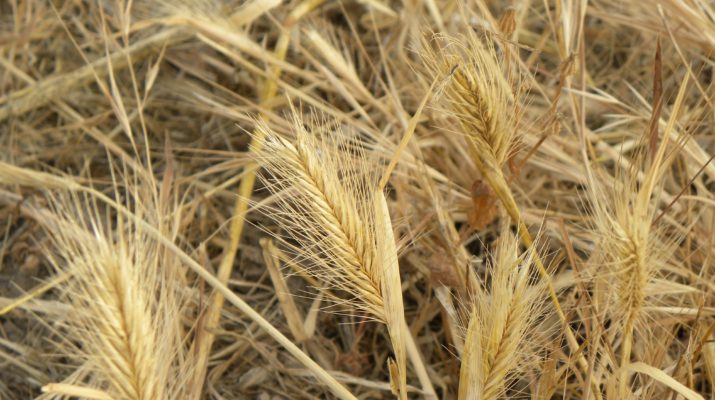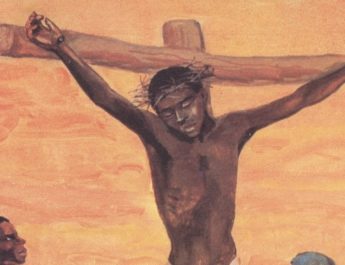Mark 4:26-34
Ordinary B29
26 He also said, “The kingdomA of GodB is as if someoneC would scatterD seedE on the ground,F
A “kingdom” = basileia. From basileus (king, emperor, sovereign); probably from basis (step, hence foot; a pace); from baino (to walk, to go). This is kingdom, rule, authority, sovereignty, royalty, a realm.
B “God” = Theos. From Proto-Indo-European origins, meaning do, put, place. This is God or a god in general.
C “someone” = anthropos. Probably from aner (man, male, husband) + ops (eye, face). This is human, humankind. Used for all genders.
D “scatter” = ballo. This is to throw, cast, rush, place, or drop. It is throwing, but it could be with more or less velocity and with more or less force/violence.
E “seed” = sporos. 6x in NT. From speiro (to sow seed, spread, scatter); perhaps from spao (to pull, to draw a sword). This is seed or a seed that is already scattered. It is where the word “spore” comes from.
F “ground” = ge. This is earth, land, soil, region, country, the inhabitants of an area.
27 and would sleepG and riseH night and day, and the seed would sproutI and grow,J he does not knowK how.
G “sleep” = katheudo. From kata (down, against, throughout, among) + heudo (to sleep). This is to settle down to rest, to sleep, fall asleep in a literal or figurative sense.
H “rise” = egeiro. This is to awake, raise up or lift up. It can be to get up from sitting or lying down, to get up from sleeping, to rise from a disease or from death. Figuratively, it can be rising from inactivity or from ruins.
I “sprout” = blastano. 4x in NT. Perhaps from blastos (a sprout). This is to sprout, germinate, bud, or bring forth. It can also imply yielding fruit. This also shares a root with the word “blastocyte.”
J “grow” = mekuno. 1x in NT. From mekos (length); from the same as makros (long, long lasting) or akin to megas (big in a literal or figurative sense – great, large, exceeding, abundant, high, mighty, perfect, strong, etc.). This is to grow or extend.
K “know” = eido. This is to know, consider perceive, appreciate, behold, or remember. It means seeing with one’s eyes, but also figuratively, it means perceiving – seeing that becomes understanding. So, by implication, this means knowing or being aware.
28 The earthL producesM of itself,N
L “earth” = ge. Same as “ground” in v26. See note F above.
M “produces” = karpophoreo. 8x in NT. From karpophoros (fruitful, productive); {from karpos (a fruit or vegetable; sometimes an animal; figuratively, deeds, results, profits, or gain); {perhaps from harpazo (to seize by force, snatch away); from haireo (to choose, take).} + phero (to bear, bring, lead, make known publicly; to carry in a literal or figurative sense)}. This is to produce fruit or crops. It is fertile in a literal or figurative sense.
N “of itself” = automatos. 2x in NT. 2x in NT. Perhaps from autos (he, she, self, they, same) + perhaps maten (in vain, aimlessly, pointless, fruitless); {from mate (a folly) or from massaomai (to chew, gnaw); {from masso (to kneed, squeeze)}}. This is of itself, of its own will. So, it is inherently ready without outside pressure or convincing for action – spontaneous. It is where the word “automatic” comes from.
first the stalk,O then the head,P then the fullQ grainR in the head.
O “stalk” = chortos. 15x in NT. This is food, grass, hay, wheat. It can also be a place of feeding, garden, court, or pasture.
P “head” = stachus. 5x in NT. Perhaps from histemi (to stand, place, set up, establish, stand ready, stand firm, be steadfast). This is a head of grain.
Q “full” = pleres. 16x in NT. From pletho (to fill, accomplish, supply; to fill to maximum capacity). This is to be full, complete, abounding in, or occupied with.
R “grain” = sitos. 15x in NT. This is used for any kind of grain that you can eat. It is usually wheat, but it can also be barley and other grains.
29 But when the grainS is ripe,T at onceU he goes inV with his sickle,W because the harvestX has come.”Y
S “grain” = karpos. Related to “produces” in v28. See note M above.
T “is ripe” = paradidomi. From para (from beside, by) + didomi (give, offer, place, bestow, deliver; give in a literal or figurative sense). This is literally to hand over – hence to deliver, abandon, or betray. It implies a personal involvement.
U “at once” = eutheos. From euthus (immediately, upright, straight and not crooked); {perhaps from eu (good, well, well done, rightly) + tithemi (to place, lay, set, establish)}. This is directly, soon, at once.
V “goes in” = apostello. Related to “head” in v28. From apo (from, away from) + stello (to send, set, arrange, prepare, gather up); {probably from histemi (see note P above)}. This is to send forth, send away, dismiss, send as a messenger. It implies one that is sent for a particular mission or purpose rather than a quick errand. This is where “apostle” comes from.
W “sickle” = drepanon. 8x in NT – 1x in Mark 4:29 and 7x in Revelation 14. From drepo (to pluck). This is a sick or a hook for harvesting.
X “harvest” = therismos. 13x in NT. From therizo (to reap, gather, harvest); from theros (summer; the heat, which implies summer); from thero (to heat). This is harvesting or reaping. By implication, it is the crop that was harvested.
Y “come” = paristemi. Related to “head” in v28 & “goes in” in v29. From para (from beside, by) + histemi (see note P above). This is literally to place by stand. It can mean to present, exhibit, appear, bring, stand by, or prove. It can also mean to be ready, to assist, to yield, or to commend.
30 He also said, “With what can we compareZ the kingdom of God, or what parableAA will we useBB for it?
Z “compare” = homoioo. 15x in NT. From homoios (similar to, resembling, like); from the same as homou (together); from homos (the same). This is to compare, liken, resemble, become similar.
AA “parable” = parabole. Related to “scatter” in v26. From paraballo (literally to throw beside, compare, arrive, liken); {from para (by, beside, in the presence of) + ballo (see note D above)}. This is a parable, comparison, adage. Quite often a tale told or a metaphor to establish a point, but it could be a true story.
BB “use” = tithemi. Related to “at once” in v29. See note U above.
31 It is like a mustardCC seed,DD which, when sownEE upon the ground, is the smallest of all the seedsFF on earth;
CC “mustard” = sinapi. 5x in NT. Perhaps from sinomai (to hurt or sting). This is a mustard plant.
DD “seed” = kokkos. 7x in NT. This is kernel or seed.
EE “sown” = speiro. Related to “seed” in v26. See note E above.
FF “seeds” = sperma. Related to “seed” in v26 & “sown” in v31. From speiro (see note E above). This is something sown so it could be seed or offspring and descendants. This is where the word “sperm” comes from.
32 yet when it is sown it grows upGG and becomesHH the greatestII of all shrubs,JJ and puts forthKK largeLL branches,MM
GG “grows up” = anabaino. Related to “kingdom” in v26. From ana (up, back, among, again, anew) + the same as basis (see note A above). This is to come up in a literal or figurative sense – ascent, rise, climb, enter.
HH “becomes” = ginomai. This is to come into being, to happen, become, be born. It can be to emerge from one state or condition to another or is coming into being with the sense of movement or growth.
II “greatest” = megas. Related to “grow” in v27. See note J above.
JJ “shrubs” = lachanon. 4x in NT. From lachaino (to dig). This is a vegetable, herb, or other plant in a garden.
KK “puts forth” = poieo. This is to make, do, act, construct, abide, or cause.
LL “large” = megas. Same as “greatest” in v32. See note J above.
MM “branches” = klados. 11x in NT. From klao (to break in pieces as one breaks bread). This is a branch, twig, or bough. It can also refer to descendants.
so that the birdsNN of the airOO canPP make nestsQQ in its shade.”RR
NN “birds” = peteinon. 14x in NT. From petomai (to fly). This is something with wings i.e. a bird.
OO “air” = ouranos. May be related to oros (mountain, hill) with the notion of height. This is the air, the sky, the atmosphere, and heaven. It is the sky that is visible and the spiritual heaven where God dwells. Heaven implies happiness, power, and eternity.
PP “can” = dunamai. This is to be able, or something that is possible. It can also be empowered or being powerful. The Greek word for “miracle” (dunamis) comes from this root.
QQ “make nests” = kataskenoo. 4x in NT. From kata (down, against, throughout, among) + skenoo (to encamp, pitch a tent, dwell); {from skenos (tent, booth, tabernacle, or dwelling)}. It could be a cloth hut. This is a tent in a literal or figurative sense ); {perhaps related to skeuos (vessel, tool, container, implement; also vessel in a figurative or literal sense) or perhaps related to skia (shadow, thick darkness, outline; figurative for a spiritual situation that is good or bad)}. This is to encamp or dwell. It is used figuratively for to lodge, stay or rest.
RR “shade” = skia. 7x in NT. This is shade, shadow, outline. It can also metaphorically refer to a spiritual reality whether positive or negative.
33 With many such parables he spoke the wordSS to them, as they were ableTT to hearUU it;
SS “word” = logos. From lego (to speak, tell, mention). This is word, statement, speech, analogy. It is a word that carries an idea or expresses a thought, a saying. It could refer to a person with a message or reasoning laid out in words. By implication, this could be a topic, line of reasoning, or a motive. It can be used for a divine utterance or as Word – Christ.
TT “were able” = dunamai. Same as “can” in v32. See note PP above.
UU “hear” = akouo. This is hear or listen, but it also means to understand by hearing. This is where the word “acoustics” comes from.
34 he did not speak to them except in parables, but he explainedVV everything in privateWW to hisXX disciples.YY
VV “explained” = epiluo. 2x in NT. From epi (on, upon, what is fitting) + luo (to loose, release, untie; figuratively, to break, destroy, or annul; releasing what had been withheld). This is to loose, solve, explain, decide, interpret.
WW “private” = idios. This is something that belongs to you or that is personal, private, apart. It indicates a stronger sense of possession than a simple possessive pronoun. This is where “idiot” comes from (denoting someone who hasn’t had formal training or education and so they rely on their own understanding).
XX “his” = idios. Same as “private” in v34. See note WW above.
YY “disciples” = mathetes. From matheteuo (to make a disciple of); from manthano (to learn key facts, gain knowledge from experience; generally implies reflection as part of the learning process); from math– (thinking things through). This is a disciple, learner, or student. It is where we get “mathematics” from.
Image credit: “Wheat Ripening in Israel” by Ian Scott, 2011.




